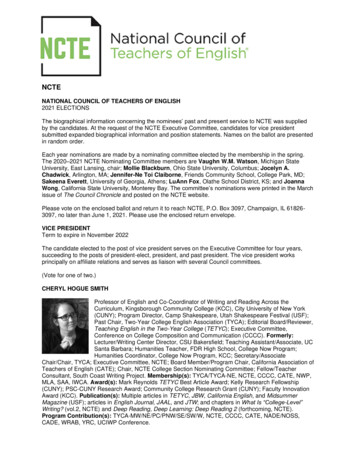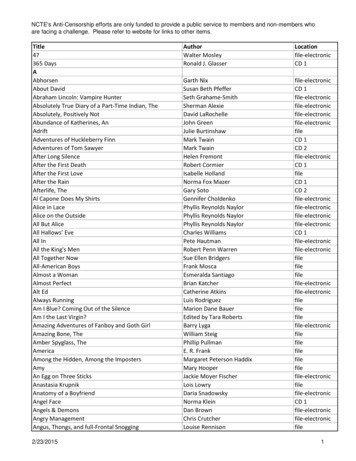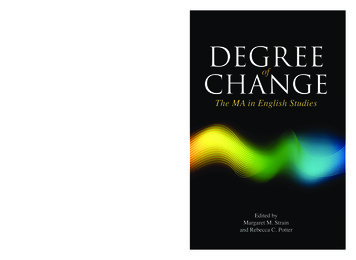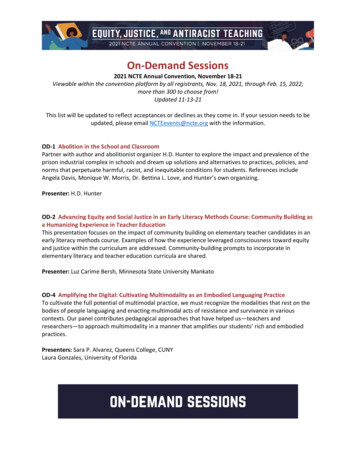
Transcription
NCTENATIONAL COUNCIL OF TEACHERS OF ENGLISH2021 ELECTIONSThe biographical information concerning the nominees’ past and present service to NCTE was suppliedby the candidates. At the request of the NCTE Executive Committee, candidates for vice presidentsubmitted expanded biographical information and position statements. Names on the ballot are presentedin random order.Each year nominations are made by a nominating committee elected by the membership in the spring.The 2020–2021 NCTE Nominating Committee members are Vaughn W.M. Watson, Michigan StateUniversity, East Lansing, chair; Mollie Blackburn, Ohio State University, Columbus; Jocelyn A.Chadwick, Arlington, MA; Jennifer-Ne Toi Claiborne, Friends Community School, College Park, MD;Sakeena Everett, University of Georgia, Athens; LuAnn Fox, Olathe School District, KS; and JoannaWong, California State University, Monterey Bay. The committee’s nominations were printed in the Marchissue of The Council Chronicle and posted on the NCTE website.Please vote on the enclosed ballot and return it to reach NCTE, P.O. Box 3097, Champaign, IL 618263097, no later than June 1, 2021. Please use the enclosed return envelope.VICE PRESIDENTTerm to expire in November 2022The candidate elected to the post of vice president serves on the Executive Committee for four years,succeeding to the posts of president-elect, president, and past president. The vice president worksprincipally on affiliate relations and serves as liaison with several Council committees.(Vote for one of two.)CHERYL HOGUE SMITHProfessor of English and Co-Coordinator of Writing and Reading Across theCurriculum, Kingsborough Community College (KCC), City University of New York(CUNY); Program Director, Camp Shakespeare, Utah Shakespeare Festival (USF);Past Chair, Two-Year College English Association (TYCA); Editorial Board/Reviewer,Teaching English in the Two-Year College (TETYC); Executive Committee,Conference on College Composition and Communication (CCCC). Formerly:Lecturer/Writing Center Director, CSU Bakersfield; Teaching Assistant/Associate, UCSanta Barbara; Humanities Teacher, FDR High School, College Now Program;Humanities Coordinator, College Now Program, KCC; Secretary/AssociateChair/Chair, TYCA; Executive Committee, NCTE; Board Member/Program Chair, California Association ofTeachers of English (CATE); Chair, NCTE College Section Nominating Committee; Fellow/TeacherConsultant, South Coast Writing Project. Membership(s): TYCA/TYCA-NE, NCTE, CCCC, CATE, NWP,MLA, SAA, IWCA. Award(s): Mark Reynolds TETYC Best Article Award; Kelly Research Fellowship(CUNY); PSC-CUNY Research Award; Community College Research Grant (CUNY); Faculty InnovationAward (KCC). Publication(s): Multiple articles in TETYC, JBW, California English, and MidsummerMagazine (USF); articles in English Journal, JAAL, and JTW; and chapters in What Is “College-Level”Writing? (vol.2, NCTE) and Deep Reading, Deep Learning: Deep Reading 2 (forthcoming, NCTE).Program Contribution(s): TYCA-MW/NE/PC/PNW/SE/SW/W, NCTE, CCCC, CATE, NADE/NOSS,CADE, WRAB, YRC, UCIWP Conference.
Position Statement: NCTE has long been at the forefront of efforts to ensure equity in schooling, and ourextraordinary work to promote social justice and antiracist teaching cements NCTE’s leadership role as avital resource for socially conscious teachers and schools. The 2021 convention theme of “Equity,Justice, and Antiracist Teaching” is especially fitting and is one more way to emphasize our commitmentto ensuring that all students have a right to a quality education that honors who they are.NCTE needs to continue with this vital work, but within our own organizational structure, we also have aless visible (and no doubt less critical) professional responsibility to correct the historic marginalization ofEnglish faculty who teach at two-year colleges. Two-year college instructors comprise “almost 40 percentof the country’s post-secondary English teaching force,” teaching “roughly half of all composition courses”at the college level (Toth et al. 92). Yet these teachers who constitute such a large percentage of collegeEnglish faculty are often forgotten about in major committees and other deliberative bodies of theCouncil—a problem I tried to correct in NCTE and CCCC Executive Committee meetings. That forgetting,however, was a constant reminder of the near invisibility of two-year college members and their distinctiveinterests within the Council.Much like K-12 schools, two-year colleges are rooted in local communities and have to fight against thesame forces that seek to preserve social inequities in classrooms and diminish the authority of teachers.As a two-year college candidate, I am committed and prepared to help the Council advance its enduringcommitments to the two great educational issues of our time: equitable and socially just classrooms andthe professionalization of teachers. My personal experiences with teaching a humanities high school dualenrollment class, teaching all levels of college, participating in two NWP K-university summer institutes,and serving on the NCTE/CCCC/TYCA Executive Committees give me the broad perspective acrosslevels that is crucial for NCTE officers and equip me to become an officer well prepared to fight for NCTEcore values for teachers from all sections.Additionally, a more attentive stance to the interests and concerns of two-year college members is sure todeepen and extend the social justice mission of the Council because two-year college classes arecharacteristically filled with racially, “linguistically, socioeconomically, and academically diverse” students(Calhoon-Dillahunt et al. 13); we have for decades been committed to the mission of achieving equity andhonoring diversity in our classrooms. Currently, I am involved in re-designing KCC’s compositioncurriculum to remove the remnants of implicit racism, social inequities, and depersonalization that troublethe current program. This work is, of course, crucial at any level, but two-year college students have mostconspicuously suffered the consequences of structural injustice and institutional racism. My experienceswith antiracist pedagogy and assessment in and out of the classroom have prepared me to advanceNCTE's most urgent contemporary agenda.In the entire 111-year history of NCTE, the Council has never elected a Vice President who distinctlyrepresents its huge number of two-year college teachers of English. I would say the time has come. Iidentify with, have provided leadership for, and fully represent two-year college teachers, and I want tohelp NCTE advance and extend its mission to promote social justice and the professionalization ofteachers at every level.ROCHELLE (SHELLEY) RODRIGOSenior Director, Writing Program; Associate Professor, Program in Rhetoric,Composition, and the Teaching of English; English, University of Arizona,Tucson, AZ. Formerly: Residential Faculty (9 years), English Department, MesaCommunity College (MCC), Mesa, AZ; Executive Committee, NCTE; Chair,College Section Steering Committee, NCTE; Parliamentarian, CCCC; ExecutiveCommittee, CCCC; Chair, TYCA-West; Executive Committee Member, TYCA;Treasurer, TYCA-West, Chair, NCTE LGBTQ and Disabled Leadership AwardDevelopment Committees; Chair, NCTE Advancement of People of ColorLeaderships Award Committee. Membership(s): NCTE, CCCC, TYCA-West,TYCA, Global Society Online Literacy Educators (GSOLE), Online Learning Consortium (OLC), Council ofWriting Program Administrators (CWPA), EDUCAUSE, Arizona Technology in Education Association(AzTEA). Award(s): Ruth Catalano Friend of Technology Innovation Award, AzTEA; Inclusive LeadershipCohort Certificate Program, UArizona; Teaching with Technology Award, ODU, Adobe Education Leader,Google Certified Teacher/Innovator; Residential Faculty Excellence Award, MCC; K. Patricia Cross
Future Leaders Award, Association of American Colleges & Universities. Publication(s): Co-Authoredthree editions Cengage Guide to Research. Co-edited, Rhetorically Rethinking Usability. Articles inComposition Forum, Composition Studies, Computers and Composition, Enculturation, TechnicalCommunication Quarterly, TETYC, and Read, Write, Think. Program Contribution(s): NCTE, CCCC,TYCA-West, TYCA SE, TYCA NE, GSOLE, Computers & Writing, OLC, CWPA,Position Statement: As literacy educators, it is our job to teach about the power of language. Readingand writing, in all modalities, changes lives. NCTE, as the oldest literacy organization in the UnitedStates, is one place where we both recognize and challenge one another for doing this critical work.NCTE has been my professional home for 20 years. Events hosted by NCTE and its relatedorganizations allow me to collaborate with professional “family” members, connect to new colleagues, andrecharge as a scholar and instructor. I value NCTE’s focus on supporting teaching and learning through avariety of lenses and frameworks. As someone: with the last name “Rodrigo” (my grandfather moved from Spain) who attended Junior High andHigh School in Southern California, but does not speak Spanish nor identify as Latinx; who is happily married to a man, but have had a long-term relationship with a woman andcomfortably identifies as bi-sexual; and who regularly conducted, presented, and published research while full-time at a communitycollege for nine years and has earned job security at two different institutions (Mesa CommunityCollege and University of Arizona) without earning tenure in the classic sense of the term;I embody a complexity (intersectionality) of both visible and invisible identity markers and experiencesthat impact my role as a learner, teacher, researcher, and administrator. But I’m not alone. All of NCTE’smembers, and their students, embody and/or are interested in a variety of identities, interests, andexperiences that inform their personal and professional identities and literacy practices. At the same time,many members and students face great inequities entrenched by cultural and societal frameworks. Bysharing these realities and how they impact our teaching and our students’ learning, we can support oneanother as we engage in the difficult work of teaching in socially just ways. In particular, we must help oneanother as we develop effective and equitable practices for teaching people to listen, learn, andcommunicate with one another in both respectful and critical ways.Trained in rhetoric, I’ve always appreciated Quintillian’s definition of a rhetorician as a “good [person]” anda “good speaker.” “Good” not only meant appropriateness but also embraced the moral perspective of therhetoric. Literacy educators are the same; we tend to be civic-minded people trying to improve thecommon good through literacy education. The call as literacy educators is not an easy one to answer. Webalance the dedicated time and energy supporting all of our students and colleagues with the selfcarerequired to stay healthy and functional (especially in this pandemic era). We show up, listen, and speakout during the tough conversations we have with our students, colleagues, and the larger public. We arekind to ourselves and others when we make mistakes, because we all do. We make our commitment tocontinuous improvement public so that our students, colleagues, and the larger public see the time,energy, and humility required of this work. NCTE offers a professional commons within which we canwork together to negotiate these realities.Returning to serve with the NCTE Executive Committee would be an honor. It would be a privilege tocontinue working with my colleagues across the nation providing opportunities for members to learn fromone another while expanding NCTE’s impact on local and national educational policies.ELEMENTARY SECTION REPRESENTATIVE-AT-LARGETerm to expire in November 2023A representative-at-large serves for two years on the Executive Committee, advising on needs andinterests of classroom teachers.(Vote for one of two.)
ALICIA ARCE-BOARDMANElementary Bilingual Teacher, Northern Parkway School 2008 - Present; Excellence inEducation through Equity Officer, Uniondale School District; 2016 - 2018, AdjunctProfessor, SUNY Old Westbury; Director/Dyad member 2013-2020 PDCRT. Award(s):Early Childhood Educator of the Year 2018. Publication(s): No More CulturallyIrrelevant Teaching (Co Author), La Historia de Mi Nombre (Co Author). ProgramContribution(s): NCTE, ECEA, NABE.Position Statement: As a member of NCTE since 2013, I have had the opportunity togrow professionally and personally through the many relationships I have been able tobuild with educators across the country. It is inspiring to see educators be grounded inantiracist, culturally responsive and anti bias teaching in their literacy practices. We must continue to pushforward, to ensure the voices and stories of all our students are heard.JANICE R. BAINESSecond-grade teacher, Ph.D. Candidate Columbia, SC. Membership(s): NCTE,ECEA, IRA, PSTA, SCEA. Award(s): Early Career Educator of Color LeadershipAward (2011). Publication(s): We’ve Been Doing it Your Way Long Enough:Choosing the Culturally Relevant Classroom. Program Contribution(s):Presentations at NCTE, AEEC, MEC, Sankofa, ISAAC.Position Statement: As a teacher-activist, I support NCTE’s work to create spaceswelcoming to educators of Color. As our country seeks to dismantle whitesupremacy, I bring a focus on African Diaspora literacy as critical to building anequitable society, and pledge to support NCTE in leading this work.MIDDLE LEVEL SECTION REPRESENTATIVE-AT-LARGETerm to expire in November 2023A representative-at-large serves for two years on the Executive Committee, advising on needs andinterests of classroom teachers.(Vote for one of two.)TANISCA M. WILSONMiddle school English teacher. Formerly: Adjunct Professor of Secondary Education,Southern University; Coordinator of Certification & Teacher Education; Director ofPraxis Prep Program, Correctional Educator; 23 years of educationexperience. Membership(s): NCTE, NAMLE National Association of Media LiteracyEducation; member of Zeta Phi Beta Sorority, Inc. Award(s): Title III Grant.Publication(s): Chapters in Women in Education: Narratives of challenge, success andchange and Women in Education: Succeeding despite inequities, discrimination andother challenges. Program Contribution(s): AACTE; NASPA.Position Statement: Teachers of English have an increasingly growing need forcurriculum diversity, staunch advocacy, and inclusive policy to support their work in classrooms andcommunities. To support these needs, I will advocate for action that will innovate, inspire, and include. Inthis way, I will continue to support NCTE’s mission in striving for the full participation of the Englishlanguage and the profession in society.
LAKISHA ODLUMEighth-grade English teacher, New York City Department of Education(NYCDOE). Formerly: Middle Level Section Nominating Committee; NCTELead Ambassador; NCTE Middle Level Reviewer; Curriculum Developer forthe Digital Public Library of America (DPLA); English Education Instructor,Teachers College, Columbia University; ELA Curriculum Evaluator(NYCDOE); ELA Curriculum Coach (NYCDOE). Membership(s): NCTE,LRA. Publications: Icons of African American Literature: The Black LiteraryWorld; New York Public Library Learning Blog; DPLA Primary Source Sets;Education Week Blog. Program Contribution(s): Presentations at NCTE and LRA.Position Statement: NCTE teachers deserve leaders who understand the everyday realities of the 21stcentury classroom. This includes the need for programming that challenges teachers to continuallyconfront and dismantle their racist ideologies, supporting teachers in developing curriculum that ismeaningful to the demographic they teach, and incorporating multiple voices in decision-making. I wouldbe honored to serve the Middle Level Section as Representative-at-Large.TRUSTEES OF THE RESEARCH FOUNDATIONTerm to expire in November 2024A trustee of the Research Foundation serves for a three-year term, passes judgment on researchproposals received from the field, and manages fiscal resources of the Foundation.(Vote for one of two.)KELLY WISSMANAssociate Professor of Literacy Teaching and Learning, University at Albany-SUNY;Co-Editor, Language Arts; Director, Capital District Writing Project. Formerly: NCTEL. Ramon Veal Seminar Mentor; AERA Writing and Literacies SIG AwardsCommittee. Membership(s): NCTE, LRA, AERA. Award(s): Chancellor’s Award forExcellence in Teaching; President’s Award for Exemplary Public Engagement; NCTEResearch Foundation Grant; Children’s Literature Assembly Research Award.Publication(s): Teaching Global Literature in Elementary Classrooms: A CriticalLiteracy and Teacher Inquiry Approach; articles in Research in the Teaching ofEnglish; Journal of Children’s Literature; English Education; English Journal.Program Contributions(s): Presentations at NCTE, AERA, LRA, NCTEAR.Position Statement: Across my participatory research and equity-minded teaching, I aim to createhumanizing spaces worthy of students’ brilliance and embracing of their multiple languages and literacies.As a trustee, I would support the vital mission of CNV and the grants programs to amplify the voices ofsocially transformative researchers committed to education as a “practice of freedom” (hooks).JUSTIN GRINAGEAssistant professor of Literacy Education, University of Minnesota; English educationprogram coordinator. Formerly: High school English teacher for 11 years, AERADivision B Section 3 Co-Chair, AERA Postcolonial Studies SIG Secretary.Membership(s): NCTE, AERA. Award(s): NCTE Cultivating New Voices amongScholars of Color Fellow, NCTE/ELATE Janet Emig Award, Curriculum Inquiry WritingRetreat Fellow. Publication(s): articles in English Education, Journal of Languageand Literacy Education, Harvard Educational Review, Curriculum Inquiry, Journal ofCurriculum Theorizing; Book Chapters in White Teachers, Diverse Classrooms;Talking about Race: Alleviating the Fear. Program Contribution(s): NCTE, AERA.Position Statement: I am passionate and dedicated to promoting equity and antioppressive policies and practices within my teaching, research, and leadership roles. My goals are tobuild upon these experiences to advocate for similar actions within the Research Foundation as is
consistent with NCTE’s overall mission of equity. As a former CNV fellow, I would consider it an honor towork in this capacity.NOMINATING COMMITTEETerm to expire in August 2022A nominating committee member gives regional and teaching-level representation to the electiveprocesses of the Council and helps to choose candidates for other posts as well as the nominatingcommittee for the following year. The person receiving the most votes serves as chair.(Vote for one in each group.)GROUP A—SECONDARY SECTIONKAHDEIDRA MONÉT MARTINPh.D. Candidate, Urban Education, The Graduate Center-City University of NewYork (CUNY); Adjunct professor, Department of Curriculum & Teaching, HunterCollege-CUNY; Research Assistant, CUNY-Initiative on Immigration andEducation; Scholar in Residence, The Chapin School, NY. Formerly: AERADivision G Campus Liaison, 7–12th certified special education teacher, BeaconCenter Assistant Director. Membership(s): NCTE, NCTEAR, AERA, ELATESocial Justice Commission. Award(s): 2020 Graduate Student Teaching Award,Dean K. Harrison Dissertation Fellowship, Edwidge Danticat Graduate StudentResearch Award, Mellon Humanities Alliance Teaching Fellowship.Publication(s): Saltwater Rivers, I Love Myself, Do You?, Saturdays Are MyFavorite Days; co-author, Classroom Talk for Social Change; articles in English inEducation, Cahiers internationaux de sociolinguistique, New York State TESOL Journal. ProgramContribution(s): NCTE, AERA, KOSANBA.Position Statement: As a writer and educator, NCTE provides a rare space that nourishes all of myrelationships with language, allowing me to advocate for linguistic justice and humanizing languagepedagogy for all.JODY N. POLLECKAssociate professor of literacy, Hunter College-City University of New York; CoChair, ELATE-Social Justice Commission. Formerly: Secondary literacy and ELAteacher and instructional coach for 20 years; LRA Area 6 Chair for Adolescent,College, and Adult Literacy Processes. Membership(s): AERA, ALER, LRA, NCTE.Award(s): Fulbright Scholar 2018-2019, Amsterdam, Netherlands; ALER TeacherEducation Research Award; Hunter College Presidential Award for Excellence inTeaching. Publication(s): ALAN Review; The Clearing House; English Journal;High School Journal; Journal of Research in Reading; Preventing School Failure;Reading and Writing Quarterly; Reading Horizons; Teacher Education Quarterly.Program Contribution(s): AERA, ELATE, IFTE, LRA, NATE, NCTE.Position Statement: I am deeply committed to anti-racism, diversity, and inclusion across all ELAspaces and communities, and thus, look forward to working collectively with educators, communitymembers, and scholars for cultivating and sustaining leadership and strong missions for equity andjustice both within and beyond NCTE.
DAVENA JACKSONAssistant professor of urban education with a focus on English, language, andliteracy education, Boston University. Formerly: Secondary English teacher anddepartment chair. Membership(s): NCTE, LRA, NCTEAR, AERA. Award(s): NCTECultivating New Voices among Scholars of Color. Excellence-In-Teaching CitationsAward; The Ray Lawson Excellence in Teaching Award, Michigan Council Teachersof English. Publication(s): International Review of Qualitative Research; TeachersCollege Record; Journal of Literacy Research. Program Contributions(s): NCTE,NCTEAR, AERA.Position Statement: Our responsibility as English language arts educators is tomodel pedagogy that is justice-oriented and provide curricular choices that supportand affirm all our students’ full humanity. NCTE needs leaders who desire to work in solidarity andadvocate for cultural, linguistic, and racial justice while working with practicing and future teachers. Itwould be my honor to serve on the Nominating Committee to support NCTE’s vision for equity, justice,and growth.(Vote for one in each group.)GROUP B—COLLEGE SECTIONJOLIVETTE MECENASAssociate Professor of English and Composition Coordinator, California LutheranUniversity. Formerly: Associate Professor and Writing Program Director,University of La Verne; Visiting Faculty and Interim Writing Program Director,English Department, CSU Los Angeles. Membership(s): NCTE, CCCCAsian/Asian American Caucus, Council of Writing Program Administrators,Rhetoric Society of America. Award(s): NCTE/CCCC Scholars for the Dream.Publication(s): Chapters on NCTE history in Writing and Working for Change andBuilding a Community, Having a Home; chapter in Representations: Doing AsianAmerican Rhetoric. Articles in Open Words: Access and English Studies; WPAJournal (forthcoming); National Public Radio. Program Contributions: NCTE, CCCC, CWPA, RSA.Position Statement: My teaching and research focuses on equity, access, and culturally relevantcurricula in writing, rhetoric, and teacher education programs in private and public minority-servinguniversities. I am committed to building coalitional dialogue and action across NCTE members and thecommunities we teach.XIAODI ZHOUAssistant professor of literacy studies, University of Texas Rio Grande Valley.Formerly: Assistant professor of education, Georgia Southwestern StateUniversity. Membership(s): NCTE, LRA, National Writing Institute.Publication(s): Book: Translanguaging for Emergent Bilinguals: InclusiveTeaching in the Linguistically Diverse Classroom; book chapters in Land ofOpportunity: Immigrant Experiences in the North American Landscape, TheSAGE Encyclopedia of Educational Research, Measurement, and Evaluation,Exploring Nonfiction Literacies; articles in Culture & Psychology, Journal ofMixed Methods Review, Journal of Education, American Educational Research Journal, Children’sLiterature in English Language Education. Program Contribution(s): NCTE, LRA, AERA, TESOL,WRAB.Position Statement: Having been a member of NCTE ever since 2012, I have experienced the inclusive,progressive culture nourished by this organization. As a member of the nominating committee, I will workon recruiting more voices representative of our diverse society so that all perspectives may be included inthe vision of NCTE.
CRISTYN L. ELDERAssociate Professor, Director, Rhetoric and Writing and WAC Program,University of New Mexico. Professional Activities: CCCC ExecutiveCommittee, CCCC Research Committee, and CCCC Emergent ResearchCommittee; Co-founder, WPA-GO. Awards: UNM Outstanding Teacher of theYear, Council on Basic Writing Award for Innovation, UNM New Teacher of theYear, UNM Outstanding Faculty Student Service Provider. Publications: coeditor, Defining, Locating, and Addressing Bullying in the WPA Workplace;articles in Across the Disciplines, Composition Forum, Composition Studies,Writing Center Journal, WPA: Writing Program Administration.Position Statement: As WAC director at a Hispanic-Serving Institution with a significant indigenouspopulation, where over 50% of students are first-generation, I work with faculty across disciplines onstrengthening support for traditionally marginalized student populations. As a member of the NominatingCommittee, I wish to identify candidates to help lead our organization forward with a similar focus: adedication to diverse students and their success.(Vote for one in each group.)GROUP C—MIDDLE SECTIONDEBORAH VRIEND VAN DUINENAssociate professor, Hope College, Michigan: Director of NEA Big ReadLakeshore. Formerly: ELA Secondary teacher; NCTE Committee onResolutions, MCTE Executive committee. Membership(s): NCTE, ELATE,ALAN, MCTE. Award(s): MRA Individual Literacy Award, TAR Editors Award forColumn Excellence. Publication(s): Articles in Voices in the Middle, EnglishJournal, The Reading Teacher, Journal of Adolescent and Adult Literacy, Bookchapter in Research on Teaching and Learning with the Literacies of YoungAdolescents. Program Contribution(s): Presentations at NCTE, NCTEAR,ALAN, MCTE, AERAPosition Statement: For 18 years, NCTE has been my professional home, connecting me withthoughtful, passionate educators, helping me remain current in my teaching and research, andchallenging me to expand conversations around literacy, assessment, curriculum, and pedagogy. Whileserving on the Nominating Committee, I will work collaboratively to cultivate and recruit a leadership teamcommitted to leading with vision, integrity, equity, and empathy.JEREMY HYLERSixth through eighth-grade English and science teacher; Columnist atMiddleWeb; Author. Formerly: Co-director of CRWP, Vice President ofATEG. Membership(s): NCTE, NWP, AMLE, MACUL, IRA. Award(s):Nominated for 2020 Michigan Teacher of the Year; Nominated for 2015 MACULTechnology Using Teacher of the Year. Publication(s): Ask, Explore, Write!: AnInquiry-Driven Approach to Science and Literacy Learning, From Texting toTeaching: Grammar Instruction in a Digital Age, Create, Compose, Connect:Reading, Writing, and Learning with Digital tools. Program Contribution(s):NCTE, MACUL, MRA, IRA, NWP, MAMSE, MSTA.Position Statement: I am a middle school teacher who wants to create fair and equitable opportunitiesfor all students. It is rewarding being a part of a middle school student’s life. The middle level steeringcommittee plays a vital role in helping middle school teachers to become the best they can be for theirstudents. The opportunity to serve this committee would ensure more teachers and students needs aremet.
DIANE WAFFProfessor of Practice, Penn GSE, Philadelphia Writing Project director. Formerly:English Teacher; NCTE Nominating Committee; Associate general chair, 2009NCTE Annual Convention; Secondary Section Steering Committee (chair 2006–2008; associate chair 2005–2006). Membership(s): NCTE, NWP, BLTN, AERA.Award(s): Penn GSE William B. Castetter Alumni Award; Scholastic Art andWriting Awards Service Award; NWP Hechinger Award. Publication(s): OnTeacher Inquiry: Approaches to Language and Literacy, co-author;Reconceptualizing the Literacies in Adolescent’s Lives; co-editor; articles in EnglishJournal, Language Arts, Educational Action Research. Program Contribution(s):NCTE, AERA, ILA.Position Statement: Teaching and learning in today’s times requires educatorswho recognize the importance of critical literacy and leadership at every level. I will work to recruiteducators who will pay attention to issues of race, identity and relevance as we grapple as anorganization with what it means to teach, learn and lead through and beyond crises in the field of ELA.(Vote for one in each group.)GROUP D—ELEMENTARY SECTIONCORINNE ARENSDistrict Instructional Coach, Blue Springs, MO; adjunct professor, Northwest MissouriState and University of Central Missouri. Formerly: Literacy Coach, K–5 classroomteacher. Award(s): District Teacher of the Year Nominee. Publication(s): Co-Author,A Teacher’s Guide to Writing Workshop Essentials; Time, Choice, Response. CoAuthor, Coming Back to Essentials in Teaching Writing. Membership(s): NCTE,MLA, ILA, NWP, Greater Kansas City Writing Project, MSTA, CEA. ProgramContribution(s): GKCWP, Missouri Department of Elementary and SecondaryEducation, NCTE, Missouri State School Board Association, NWP.Position Statement: My membership to NCTE has disrupted my teaching and hasexponentially expanded my efforts in advancing socially just literacy practices. As amember of the nominating committee, I will continue to listen, learn, collaborate, and recruit a rich varietyof voices who will continue to uphold the mission of this important organization. Keeping humans at theforefront of the decision-making process is what I value and will always make a priority.SANDRA LUCIA OSORIOAssociate professor, school of teaching and learning, Illinois State University;chair, NCTE Early Childho
Cohort Certificate Program, UArizona; Teaching with Technology Award, ODU, Adobe Education Leader, Google Certified Teacher/Innovator; Residential Faculty Excellence Award, MCC; K. Patricia Cross . Future Leaders Award, Association of American Colleges & Universities. . connect to new colleagues, and recharge as a scholar and instructor. I .










